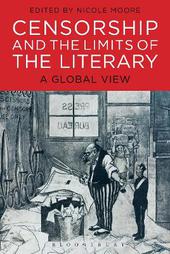
|
Censorship and the Limits of the Literary: A Global View
Paperback / softback
Main Details
| Title |
Censorship and the Limits of the Literary: A Global View
|
| Authors and Contributors |
Edited by Nicole Moore
|
| Physical Properties |
| Format:Paperback / softback | | Pages:272 | | Dimensions(mm): Height 229,Width 152 |
|
| Category/Genre | Literary theory |
|---|
| ISBN/Barcode |
9781501330391
|
| Classifications | Dewey:801 |
|---|
| Audience | | Tertiary Education (US: College) | |
|---|
| Illustrations |
2 Maps
|
|
Publishing Details |
| Publisher |
Bloomsbury Publishing Plc
|
| Imprint |
Bloomsbury Academic USA
|
| Publication Date |
23 February 2017 |
| Publication Country |
United States
|
Description
Though literature and censorship have been conceived as long-time adversaries, this collection seeks to understand the degree to which they have been dialectical terms, each producing the other, coeval and mutually constitutive. On the one hand, literary censorship has been posited as not only inescapable but definitive, even foundational to speech itself. One the other, especially after the opening of the USSR's spekstrahn, those enormous collections of literature forbidden under the Soviets, the push to redefine censorship expansively has encountered cogent criticism. Scholars describing the centralised control of East German print publication, for example, have wanted to insist on the difference of pre-publication state censorship from more mundane forms of speech regulation in democracies. Work on South African apartheid censorship and book banning in colonial countries also demonstrates censorship's formative role in the institutional structures of literature beyond the metropole. Censorship and the Limits of the Literary examines these and other developments across twelve countries, from the Enlightenment to the present day, offering case studies from the French revolution to Internet China. Is literature ever without censorship? Does censorship need the literary? In a globalizing era for culture, does censorship represent the final, failed version of national control?
Author Biography
Nicole Moore is Associate Professor in English at the University of New South Wales, Canberra, Australia. She is the author of The Censor's Library: Uncovering the Lost History of Australia's Banned Books, which was shortlisted for the Prime Minister's Australian History Prize 2013, and co-editor of The Literature of Australia (2009).
Reviews[A] remarkable collection ... The strength of this book lies in its range of research, with twelve nation states across four centuries being explored ... An important contribution to the scholarship, providing a wealth of original and engaging research. * Times Literary Supplement * [An] ambitious project ... [The contributions] provide a unique and carefully-orchestrated insight into the critical directions they emulate. * OCCT Review * Nicole Moore, an expert on censorship, has put together a remarkable collection of erudite and thoroughly researched case studies that bust open prevailing ideas about the history of censorship since the Enlightenment. Tracking the course of subversive writing-from pamphleteering to jumping the Great Firewall-these essays survey four centuries of state efforts to squelch literary expression in Europe, America, Asia and Australia. From the ancien regime to the Arab Spring, collectively the authors survey twelve national stages to argue that the dance of literature and censorship presents a complex performance that at once sequesters and encourages suspicious relations between the state and its discontents. Whether overt or "soft" and self-imposed, censorship imbricates the law and art, casting itself as crucial to the invention of literature as a concept. Censorship exceeds the usual suspects: prigs, prudes, priests, police. It's very elusiveness a sign of its debt to literary thinking. * Paula Rabinowitz, Professor of English, University of Minnesota, USA, and author of American Pulp: How Paperbacks Brought Modernism to Main Street (2014) * This stimulating collection explores the ways literature and censorship can be mutually constitutive, rather than straightforwardly opposing forces. Contributors examine the dialectic of literature and censorship in contexts ranging from ancient regime France to apartheid South Africa, from the Dutch East Indies to East Germany, from Regency England to contemporary Egypt. Nicole Moore's excellent introduction synthesizes the insights of recent work in the field and marks out future possibilities. * Christopher Hilliard, Professor of History, The University of Sydney, Australia *
|